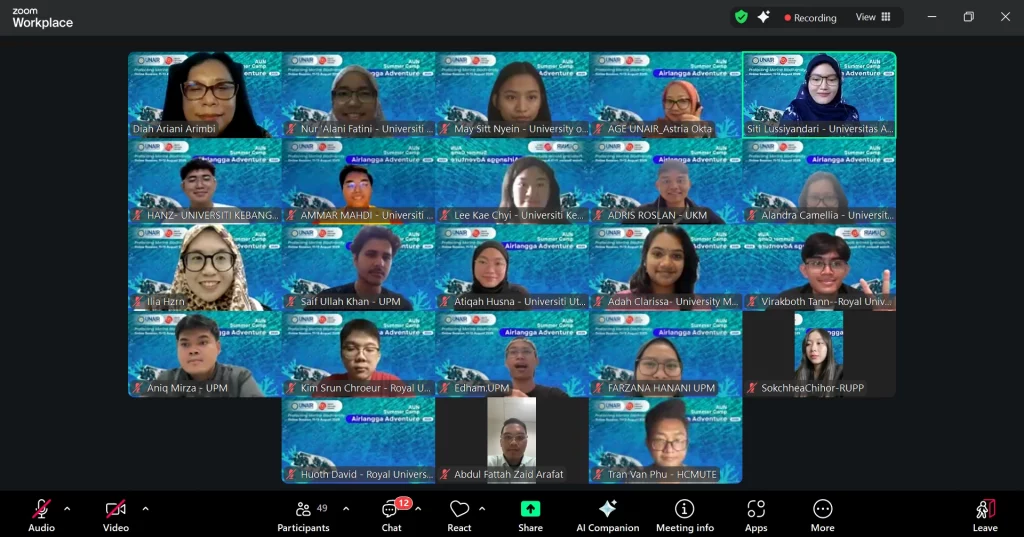UNAIR NEWS – Universitas Airlangga (UNAIR), through Airlangga Global Engagement (AGE) in collaboration with the Faculty of Veterinary Medicine and the Faculty of Health, Medicine, and Natural Sciences (FIKKIA), officially launched the AUN Summer Camp: Airlangga Adventure (AIRVENTURE) 2025 on Monday, August 11, 2025. The program, organized in partnership with the ASEAN University Network (AUN), combines both online and in-person activities in Surabaya.
This year’s theme, “Protecting Marine Biodiversity,” provides an avenue for students from diverse cultural backgrounds to experience Indonesia—particularly the city of Surabaya—while fostering greater awareness of marine ecosystem preservation. Representing AGE UNAIR, Astria Okta delivered a welcome address to all participants.
“We sincerely thank the ASEAN University Network (AUN) for giving Universitas Airlangga the opportunity to be part of this summer program series. This year, AIRVENTURE 2025 focuses on preserving marine habitats under the theme Protecting Marine Biodiversity. This program offers the perfect platform to learn, connect, and build conservation awareness. We hope every small step we take will create a lasting impact on environmental sustainability,” said Astria Okta.
Introducing Surabaya as City of Heroes
One of the featured sessions was presented by Prof. Diah Ariani Arimbi, S.S., M.A., Ph.D., a lecturer from the Faculty of Humanities (FIB) and Head of UNAIR’s Center for Language and Multicultural Studies. Her presentation, “Surabaya and Its Landscape,” described Surabaya as Indonesia’s second-largest metropolitan city, strategically situated along the northeastern coast of Java and near Madura Island.
Prof. Arimbi also shared the origins of Surabaya’s title City of Heroes, which honors the bravery of Surabaya’s youth during the fight against colonial forces on November 10, 1945—an event still commemorated through theatrical reenactments. “The title City of Heroes emerged from the courage of Surabaya’s people. In the past, Arek Suroboyo sharpened bamboo spears to defend their land from colonial powers. Today, the historic Tunjungan area, once the stage of that struggle, has transformed into a bustling shopping and tourism hub while preserving heritage buildings that draw young visitors,” she noted.
Cultural diversity and urban revitalization
Prof. Arimbi further highlighted Surabaya’s multicultural composition, comprising Javanese, Madurese, Chinese-Indonesian, and Arab communities. This diversity has created a distinctive cultural blend where traditional values coexist with various influences. As an example, she pointed to the close proximity of different religious sites as a symbol of Surabaya’s enduring interfaith harmony.
The city’s diversity is also reflected in the character of its kampung kota (urban villages), where residents live in close-knit communities, engage in collective activities, and show mutual care. This solidarity was especially visible during the pandemic, when neighbors placed essential goods at designated points for those in need.
“When you visit Surabaya, you’ll see narrow, densely populated alleys where residents interact like family. Rows of houses lining tight passageways are a distinctive feature—unlike large cities dominated by apartment towers. Surabaya is often described as a village within a city,” Prof. Arimbi explained.
Author: Kania Khansanadhifa Kallista
Editor: Ragil Kukuh Imanto









